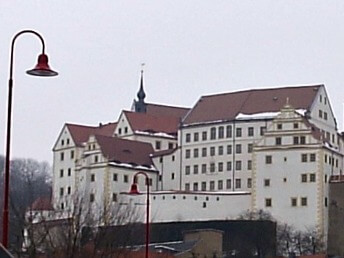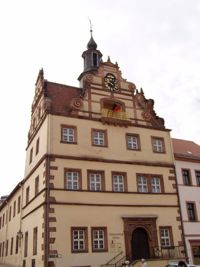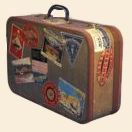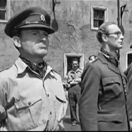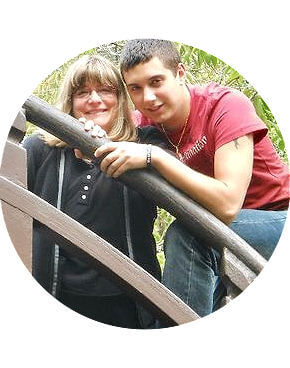- Home
- Colditz Castle
- Colditz History
More Colditz History
The Lighter Side of Colditz
Colditz history wasn't all escape activity. Prisoners devoted some of their energy to driving the guards crazy, as well as putting on a remarkable collection of plays and shows in Theater Colditz.
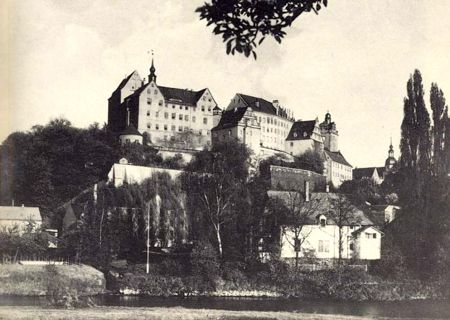 Colditz Castle 1945
Colditz Castle 1945Fun and Games
Some of the men specialized in causing mischief. Goon-baiting, or teasing the German guards, was a popular activity and one of the more humorous aspects of Colditz history.
The prisoners' quarters were high up facing a small inner courtyard used for roll calls and exercise. Guards who made the mistake of standing under the windows and forgetting to look up often had water poured onto their heads.
Sometimes, the prisoners dropped more unpleasant things. If they were lucky, it was only wads of paper. One of the British lieutenants reportedly enjoyed dropping some truly disgusting objects.
Usually they weren't caught, although sometimes the entire group lost privileges as a result. One officer was court-martialed in Leipzig for saying "b------d Germans"; he was sentenced to 3 months in a German military prison.
French Humor
The French prisoners went out of their way to drive the Germans crazy. Colditz prisoners usually had four roll calls in the courtyard every day. The French would start a call and response chant between two groups.
They chanted insulting verses without moving their lips so the Germans couldn't tell who was doing it. Sometimes they would keep it going through the entire roll call. One of the favorite ones was from World War I:
Ou sont les Alemands
Dans la merde
Enfoncez-les
Jusqu'aux oreilles
The French Volunteer
Once the Germans asked for volunteers from among the prisoners to work for them outside the prison. Unexpectedly, a French prisoner stepped forward and announced he would like to work for the Germans.
There was a tense silence. He was asked what his profession had been before the war. He replied "undertaker" and was marched off to the cooler with laughter and cheering.
Inspection Surprise!
Sometimes the Germans would rush into the barracks at night and do surprise inspections, while the prisoners stood at attention next to their bunks. This naturally annoyed the prisoners, so the French planned a surprise.
One warm night, the guards came running up the stone stairs to the French officers' quarters. When they came into the room, all of the officers were standing at attention by their bunks totally naked! The guards had to give up the inspection after a few minutes because they couldn't stop laughing.
Playing by the Rules
To their credit, the Germans in command at Colditz castle took the Geneva Convention seriously and made a sincere attempt to abide by the rules. They tolerated a remarkable amount of verbal abuse and annoying pranks without violent retaliation, although sometimes group privileges were withdrawn.
Security Officer Eggers wrote in his book on Colditz history, Colditz, The German Story:
"I told the British Senior Officer once, 'I will never allow you gentlemen the honour of getting me rattled. Correct behavior under the Convention or under our own disciplinary code is my line'.
I was provoked beyond belief time and time again for four years on end by the hotheads among hundreds of officers of all nationalities."
He also reported being a target for snowballs and had his cap stolen (and returned). Colditz was unusual among POW camps in strict adherence to the Convention. Prisoners at many other camps were not so lucky.
Show Time! Theater Colditz
Colditz history also included more harmonious activities. There was a theater on the third floor of the castle, left over from the days when the castle was occupied by Saxon royalty. Prisoners looked forward to these rather professional productions.
Gaslight, The Importance of Being Ernest, The Man Who Came To Dinner and Pygmalion were performed. There was also an original farce called Ballet Nonsense (glimpsed in the film The Colditz Story) with the six hairiest prisoners playing ballerinas.
The Germans supplied the prisoners with paint and tools for the stage sets along with make-up for actors. The German garrison also attended these shows; there wasn't much competition for entertainment in the small town of Colditz.
Colditz Concert: First British Home Run
Plays, concerts and original shows were a big part of Colditz history. The theater was the setting for an escape leading to the first British Home Run.
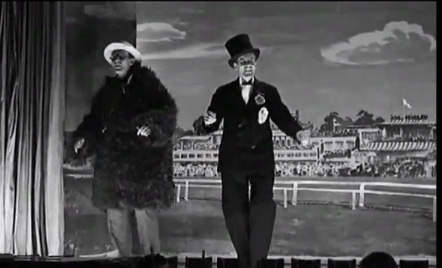 Scene from the Colditz Story
Scene from the Colditz StoryThe escape was originally planned for the showing of Ballet Nonsense, but the German uniforms weren't ready yet. The escape came two months later following a performance of Beethoven's First Symphony. Lieutenant Airey Neave and a Dutch officer, Lieutenant Tony Luteyn, waited until the concert was over (Luteyn even performed in it). They climbed under the stage to a hole in the floor and dropped down into the room below.
Dressed as German officers, they walked right through the guardhouse near the entrance and out the main gate of the castle. Both men made it home. Airey Neave later became a member of Parliament but was assassinated by an Irish terrorist group.
Captain Pat Reid, author of three books on Colditz history, helped with the escape; he picked the locks for the men to get them to the guardhouse. The 1953 film, The Colditz Story, incorrectly shows Pat Reid as the officer who walks out during the show. Reid did make a home run himself, but on a later daring escape across the German courtyard, squeezing through an air duct to freedom.
More on Colditz...
- Home ›
- Colditz Castle ›
- Colditz Light
Share this page:
